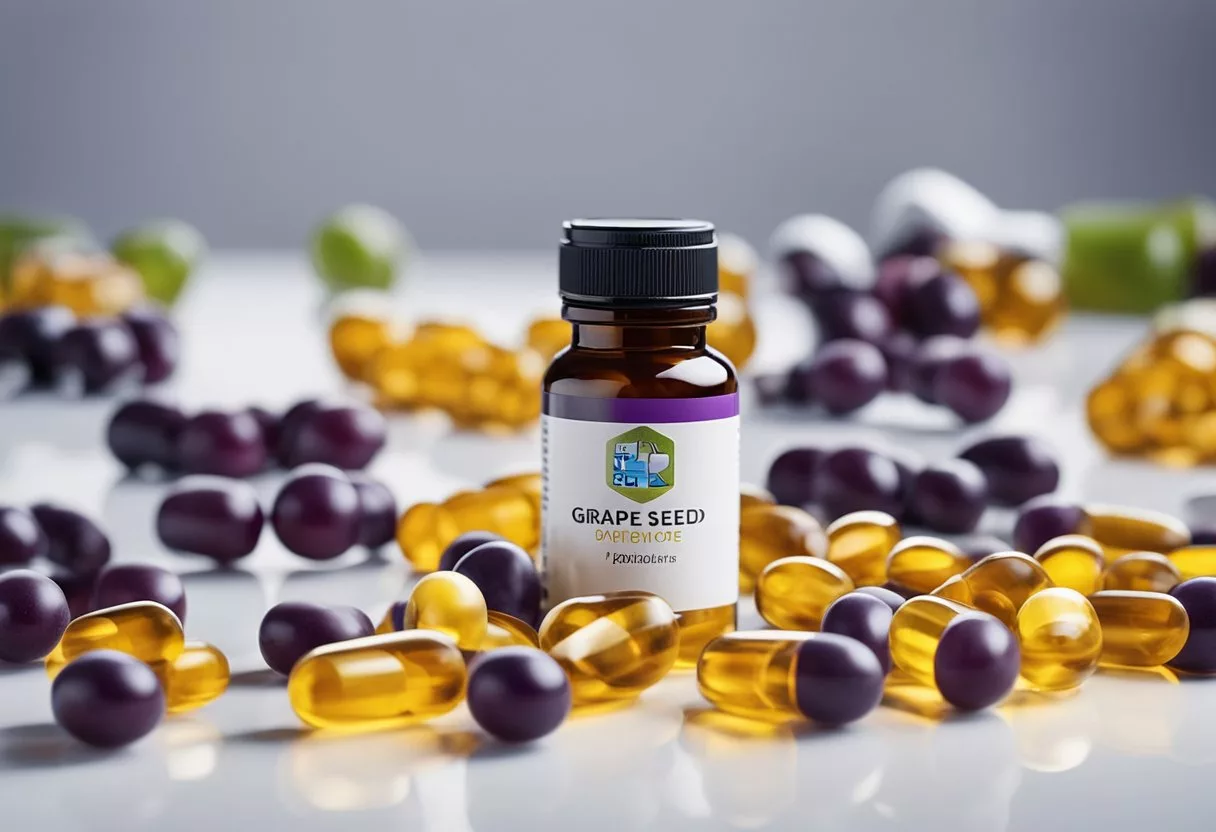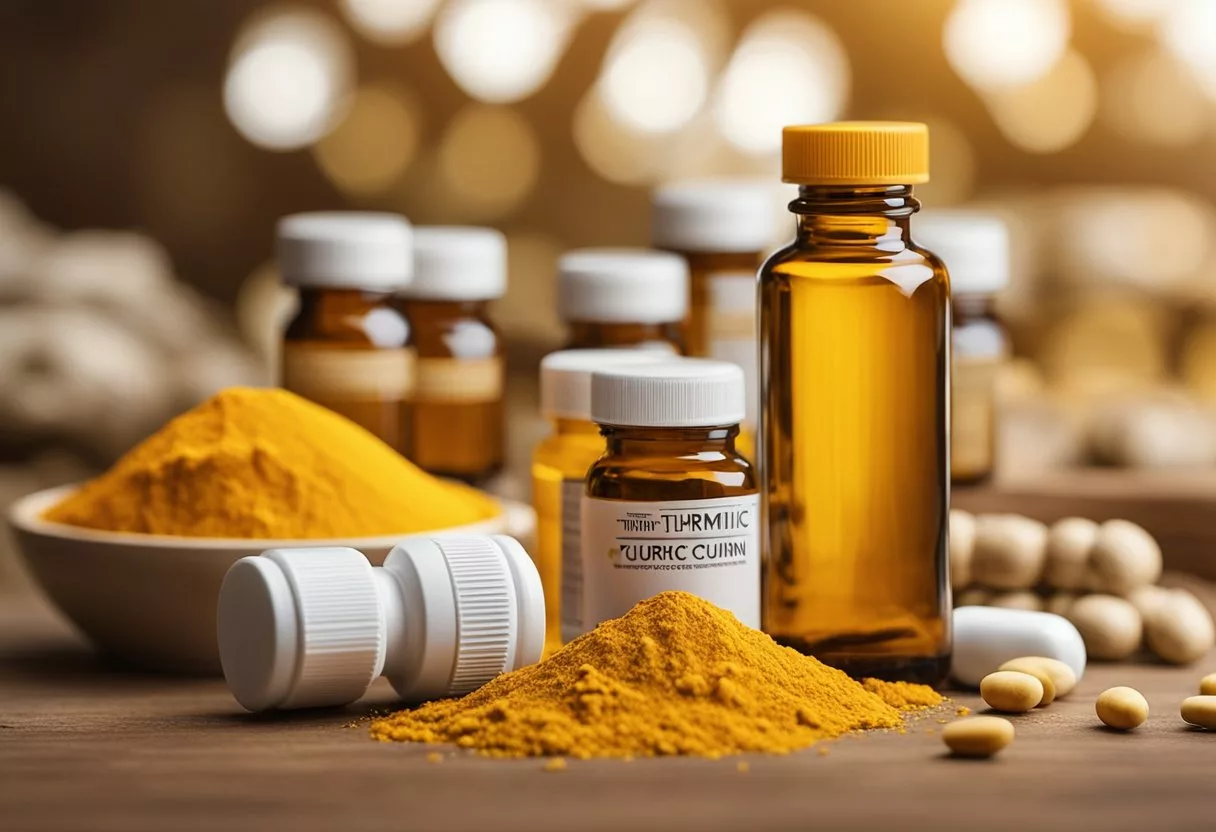Tinnitus affects millions of people worldwide, causing a persistent ringing or buzzing sound in the ears. This condition can be frustrating and impact on daily life. Many seek natural ways to find relief from tinnitus symptoms.

Introducing ZenCortex
Supports Healthy Hearing,
Strengthens Memory,
Sharpens Mental Acuity
Get it Here (Official Site)
Vitamins and supplements offer a potential option for those looking to manage tinnitus. Certain nutrients may help support ear health and reduce the intensity of tinnitus sounds. While results can vary, some people find that specific vitamins and supplements provide noticeable improvement in their symptoms.
1) Ginkgo Biloba

Ginkgo biloba is a popular herbal supplement often used for tinnitus relief. This ancient tree extract has been the subject of numerous studies exploring its potential benefits for ear ringing.
Ginkgo biloba is commonly prescribed by doctors in Europe as a first-line treatment for tinnitus. Its popularity stems from its potential to improve blood circulation, which may help reduce tinnitus symptoms.
Some research suggests that ginkgo biloba might help certain people with tinnitus. In one study, patients taking a high dose of Korean red ginseng saw better results than those taking ginkgo biloba. However, more research is needed to confirm these findings.
The typical dosage of ginkgo biloba for tinnitus ranges from 120 to 240 mg per day. It’s important to note that results can vary, and some people may not experience any improvement.
While generally considered safe, ginkgo biloba can interact with certain medications. It’s crucial to consult a healthcare provider before starting any new supplement regimen, especially for those with existing health conditions or taking other medications.
2) Zinc Supplements
Zinc is a mineral that plays a role in many bodily functions, including immune system support and wound healing. Some research suggests it may also help with tinnitus symptoms.
Zinc supplements have shown promise in improving tinnitus for certain people. A study found that zinc boosted serum levels and reduced tinnitus symptoms in those with noise-induced hearing loss.
The recommended dosage for tinnitus relief is typically 50-100 mg of zinc per day. This amount may help reduce the loudness and severity of tinnitus for some individuals.
It’s important to note that zinc supplements can have side effects. These may include nausea, vomiting, loss of appetite, dizziness, and headaches. Zinc can also interfere with the absorption of other minerals like copper.
Before starting any new supplement regimen, individuals should consult with a healthcare professional. This is especially important for those taking other medications or with existing health conditions.
3) Vitamin B12

Vitamin B12 has gained attention as a potential aid for tinnitus relief. This essential nutrient plays a crucial role in nerve function and the production of red blood cells.
Some studies suggest that vitamin B12 may help reduce tinnitus symptoms in certain individuals. A deficiency in B12 can lead to nerve damage, which might contribute to tinnitus.
In a pilot study on chronic tinnitus, patients who received vitamin B12 injections experienced improvements in their symptoms. The treatment group showed reduced tinnitus severity compared to the placebo group.
While these results are promising, more research is needed to fully understand the relationship between vitamin B12 and tinnitus. It’s important to note that not all cases of tinnitus may respond to B12 supplementation.
For those considering vitamin B12 for tinnitus relief, it’s recommended to consult with a healthcare professional. They can determine if a deficiency exists and recommend appropriate dosage and treatment methods.
Vitamin B12 can be found in animal products like meat, fish, and dairy. Vegetarians and vegans may need to consider supplements or fortified foods to meet their B12 needs.
4) Garlic Extract
Garlic extract is a popular natural remedy for tinnitus. It contains allicin, a compound with anti-inflammatory properties that may help reduce ear inflammation.
Some people use garlic oil drops in their ears to ease tinnitus symptoms. This practice aims to improve blood flow in the inner ear and potentially reduce ringing sounds.
Garlic oil is not a cure for tinnitus, but it may provide relief for some individuals. Results can vary from person to person.
Garlic supplements are another option for those seeking tinnitus relief. These capsules contain concentrated garlic extract and may be easier to take than oil drops.
It’s important to note that scientific evidence supporting garlic’s effectiveness for tinnitus is limited. More research is needed to fully understand its potential benefits.
Before trying garlic extract for tinnitus, it’s advisable to consult with a healthcare professional. They can provide guidance on proper usage and potential interactions with other medications.
5) Grape Seed Extract

Grape seed extract is gaining attention as a potential aid for tinnitus relief. This supplement comes from the seeds of grapes and contains powerful antioxidants called proanthocyanidins.
Some people believe grape seed extract may help improve blood flow to the inner ear. Better circulation could potentially reduce tinnitus symptoms for some individuals.
Grape seed extract has been included in multivitamin-multimineral supplements used in tinnitus studies. These supplements also contained other ingredients, so the specific effects of grape seed extract are unclear.
One study explored grape seed extract’s impact on nitric oxide production. Nitric oxide helps relax blood vessels, which may improve blood flow. However, more research is needed to confirm its effects on tinnitus.
It’s important to note that scientific evidence supporting grape seed extract for tinnitus relief is limited. While some people report benefits, others may not experience noticeable changes.
As with any supplement, it’s wise to consult a healthcare provider before trying grape seed extract for tinnitus. They can offer personalized advice based on your specific health situation.
6) Melatonin
Melatonin is a hormone that regulates sleep-wake cycles. It has shown promise in helping with tinnitus symptoms, especially for those who experience tinnitus at night.
Some studies suggest melatonin may reduce the intensity of tinnitus and improve sleep quality. This can be helpful since tinnitus often disrupts sleep patterns.
The recommended dose of melatonin for tinnitus varies. It’s best to start with a low dose and increase gradually if needed. Always consult a doctor before starting any new supplement.
Melatonin is generally considered safe for short-term use. However, it can cause side effects like daytime drowsiness in some people.
When buying melatonin supplements, be aware that actual content may vary from the label. Choose reputable brands and check for third-party testing to ensure quality.
While melatonin shows potential, more research is needed to fully understand its effects on tinnitus. It may work better for some individuals than others.
7) Turmeric Curcumin

Turmeric curcumin is a popular natural supplement that may help with tinnitus symptoms. The active compound in turmeric, curcumin, has powerful anti-inflammatory effects that could reduce inflammation contributing to tinnitus.
Curcumin also helps alleviate oxidative stress in the ear, which may play a role in tinnitus development. This antioxidant property could protect the delicate structures of the inner ear.
Many turmeric supplements include black pepper extract or BioPerine to enhance absorption. For example, Nature’s Nutrition Turmeric and Ginger with BioPerine provides 1,500 mg of organic turmeric root with added ginger extract.
When choosing a turmeric supplement, it’s important to look for products that have been third-party tested for purity and potency. Some reputable options include Garden of Life Extra Strength Turmeric and Life Extension Super Bio-Curcumin Turmeric Extract.
While turmeric shows promise for tinnitus relief, more research is needed to fully understand its effects. People should consult a healthcare provider before starting any new supplement regimen.
Understanding Tinnitus

Tinnitus is a common hearing condition that affects millions of people worldwide. It involves hearing sounds that aren’t caused by external sources. The causes, symptoms, and impact of tinnitus can vary greatly between individuals.
What Is Tinnitus?
Tinnitus is the perception of noise or ringing in the ears when no external sound is present. People with tinnitus may hear various sounds:
- Ringing
- Buzzing
- Hissing
- Whistling
- Clicking
These sounds can be constant or intermittent. They may vary in volume and pitch. Tinnitus is not a condition itself, but a symptom of an underlying issue.
Some people experience tinnitus in one ear, while others hear it in both. The perceived sound can range from barely noticeable to severely disruptive.
Common Causes of Tinnitus
Many factors can lead to tinnitus. Some common causes include:
- Exposure to loud noises
- Age-related hearing loss
- Earwax blockage
- Head or neck injuries
- Cardiovascular problems
- Certain medications
Stress and anxiety can also worsen tinnitus symptoms. In some cases, the exact cause remains unknown.
Prolonged exposure to loud sounds, such as music or machinery, can damage the hair cells in the inner ear. This damage often leads to tinnitus.
Symptoms and Impact on Daily Life
The main symptom of tinnitus is hearing phantom sounds. These sounds may be:
- Low-pitched or high-pitched
- Soft or loud
- Present in one or both ears
Tinnitus can significantly affect a person’s quality of life. It may cause:
- Sleep problems
- Difficulty concentrating
- Anxiety or depression
- Irritability
- Fatigue
Some people find their tinnitus worsens in quiet environments or at night. This can make falling asleep challenging.
Tinnitus symptoms can interfere with work, social activities, and relationships. Managing stress and finding effective coping strategies are key to reducing its impact on daily life.
How Vitamins and Supplements Can Help

Vitamins and supplements may offer relief for people with tinnitus. They work in different ways to support ear health and reduce symptoms.
Mechanisms of Action
Vitamins and supplements can help tinnitus in several ways. Some boost blood flow to the inner ear. This brings more oxygen and nutrients to the cells.
Others act as antioxidants. They fight damage from free radicals in the body. This can protect the delicate structures in the ear.
Some supplements may calm overactive nerves. This could reduce the ringing or buzzing sounds of tinnitus.
Scientific Evidence and Studies
Research on vitamins and supplements for tinnitus has mixed results. Some studies show promise, while others find no clear benefit.
Ginkgo biloba is one of the most studied supplements for tinnitus. Some trials suggest it may help, but not all research agrees.
Vitamin B12 has also been looked at. Low B12 levels might be linked to tinnitus in some people. But giving B12 supplements doesn’t always fix the problem.
Magnesium and zinc have shown potential in small studies. More research is needed to confirm their effects.
Potential Benefits and Risks
Vitamins and supplements may offer several benefits for tinnitus sufferers:
- Reduced ringing or buzzing sounds
- Better overall ear health
- Improved blood flow to the inner ear
- Protection against cell damage
But there are also risks to consider:
- Side effects from high doses
- Interactions with medications
- Masking underlying health issues
- False hope if supplements don’t work
It’s important to talk to a doctor before starting any new supplements. They can help weigh the pros and cons for each person’s situation.
Integrating Supplements into a Tinnitus Management Plan

Adding supplements to your tinnitus care routine takes planning and care. It’s key to work with doctors, pay attention to dosages, and mix supplements with other treatments wisely.
Consulting with Healthcare Providers
Before starting any new supplements, talk to your doctor. They can check if the supplements are safe for you and won’t clash with your other medicines. Your doctor might also suggest blood tests to see if you need certain vitamins or minerals.
Some doctors may not know much about supplements for tinnitus. In this case, you might want to see an ear, nose, and throat doctor or an audiologist who knows about tinnitus. They can give you better advice on which supplements might help.
Keep a log of your symptoms and any changes when you start new supplements. This info helps your doctor track your progress and adjust your plan if needed.
Dosage and Timing
Getting the right amount of supplements is crucial. Too little might not help, while too much could be harmful. Follow the dosage on the label or what your doctor suggests.
Some supplements work better at certain times of day. For example, B vitamins might be best taken in the morning as they can boost energy. Magnesium, on the other hand, may help you relax if taken at night.
Start with a low dose and slowly increase it. This helps you spot any side effects. It also lets your body get used to the new supplements.
Combining Supplements with Other Treatments
Supplements work best as part of a bigger tinnitus treatment plan. They can support other methods like:
- Sound therapy
- Cognitive behavioral therapy
- Relaxation techniques
- Hearing aids
Zinc and magnesium supplements might help protect your ears and reduce tinnitus symptoms. But they work even better when paired with stress-reduction methods.
Be patient when trying new supplements. It can take weeks or months to notice changes. Keep track of your symptoms and discuss any improvements or concerns with your healthcare provider.
Frequently Asked Questions

Vitamins and supplements play a role in managing tinnitus symptoms. Many people have questions about which ones to use and how they work.
What vitamins are commonly recommended for managing tinnitus symptoms?
Vitamin B12, zinc, and magnesium are often suggested for tinnitus relief. These nutrients support ear health and nerve function.
Ginkgo biloba is another popular option. It may improve blood flow to the ears.
Which natural supplements have been shown to be effective for tinnitus relief?
Ginkgo biloba and zinc have some evidence supporting their use for tinnitus. Magnesium and melatonin may also help some people.
Grape seed extract and garlic extract are being studied for their potential benefits.
What is the recommended daily dosage of vitamin B12 for individuals with tinnitus?
A daily dose of 1000 mcg of Vitamin B12 is often suggested for tinnitus relief. This amount may help reduce symptoms.
It’s important to consult a doctor before starting any new supplement regimen.
Are there any quick remedies that provide instant relief from tinnitus?
There are no proven instant cures for tinnitus. Most supplements take time to show effects.
Some people find temporary relief through relaxation techniques or white noise.
Could a vitamin deficiency be responsible for causing tinnitus?
Vitamin deficiencies, especially B12, can contribute to tinnitus in some cases. Low zinc or magnesium levels may also play a role.
Getting proper nutrition is important for overall ear health.
How long does it generally take to notice an improvement in tinnitus symptoms after starting vitamin B12 supplementation?
The time frame for noticing improvements varies. Some people report changes within a few weeks.
For others, it may take several months of consistent supplementation to see results.